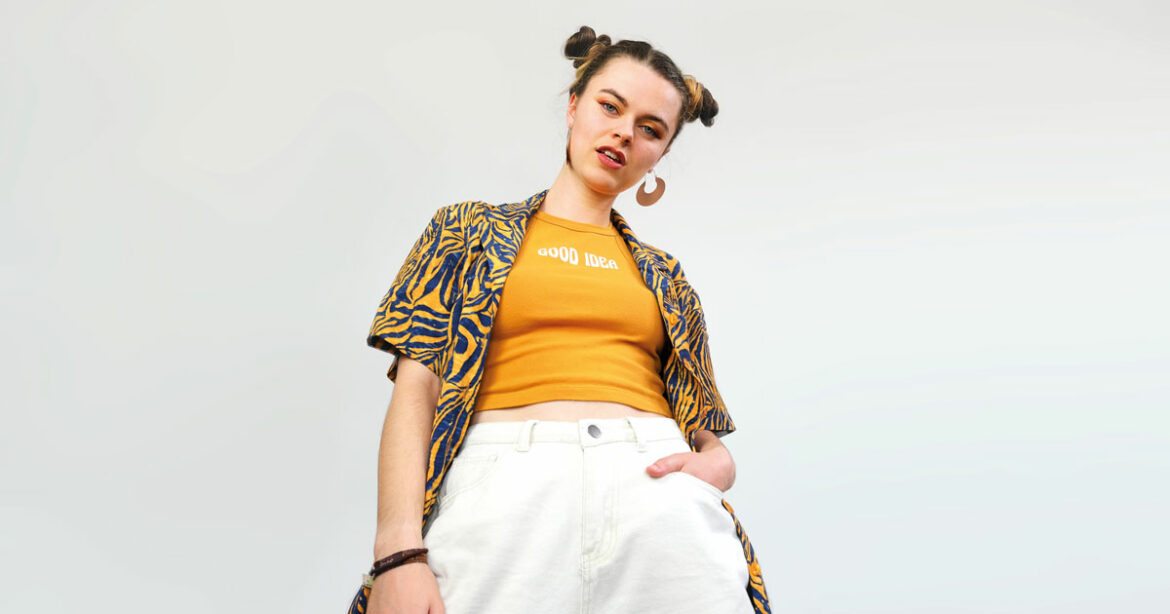Miriam Balanescu gets to know the astounding artists of all disciplines carving out space for themselves – in the city and beyond
Spanning everything from a buzzing spoken word scene to a flourishing games design industry, Cambridge is a cradle for creatives across all spheres. In facr, data suggests the region is one of the UK’s top ten locations to work in the artistic pursuits, employing nearly 15,000 people. Perhaps the city’s history as a hive of innovation has made it such a creative hotbed, harbouring an eclectic host of visionaries making themselves known in the nation and overseas. With funding scarce and artistic dens under threat, Cambridge’s bounty of venues, studios and spaces have played a crucial part in nurturing new discoveries.
The city has had more than its fair share of wave-makers, from Ai Weiwei to Charli XCX – but there is a whole new wave of Cambridge creatives ready to step up to the plate and make their mark. Allow us to introduce you…
Alexandra Cameron, Photographer
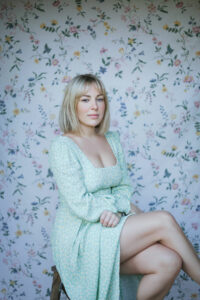
Alexandra Cameron poses for the camera
Alexandra Cameron made her first foray into photography – a skill that has launched her to viral heights and landed her in the pages of national newspapers – in her final year of studying film at university. “I loved film,” she says, “but when I got my first camera, I enjoyed how immediate photography was.”
Freelancing for the past 13 years, it was when Alexandra hit upon natural light photography, inspired by fellow photographers on Flickr, that she found a trademark style. Frankness underpins her work; in 2020, she photographed model Nyome Nicholas-Williams against the backdrop of a vintage sheet wearing only a pair of shorts. The ensuing fiasco of Instagram censorship, exposing racial prejudice on the platform, brought Alexandra to widespread attention.
“I grew up with size-zero gossip mags and the world telling you you’re not good enough,” Alexandra reflects. “I loved creating a space where women could feel safe, insecurities were respected, but beauty standards were also wiped away, so women can be themselves and celebrate who they are.
“In my early twenties, there was literally one type of woman being shown – and this wasn’t that long ago,” she continues. “The impact of the body positivity movement is absolutely massive. Photography is an artistic format that can really push that message forward.”
Her subjects now include everyone from Fearne Cotton to Dolly Alderton, and among her first was Russell Brand. “There was a chunk of people that I admired, so I tweeted them to see if anything happened,” Alexandra says. “I messaged Russell Brand and said, ‘You’re doing a gig in Cambridge on my birthday. Let me take your portrait.’ Everything’s worth a go – you’re not losing anything by trying.”
Portraiture has evolved in the age of Instagram and body positivity. “When I think of the form, it’s about capturing important or inspiring people in history and how powerful they can be,” Alexandra explains. “They show how imagery can stay in your mind.”
Alexandra’s soft, sensual aesthetic is created by shooting in her boyfriend’s parents’ shed. It’s a relaxed, informal environment, which translates to the images. “I don’t want to over-direct,” she says. “I often feel bad about bringing people into my garden, but lots of them say it’s a calming, unintimidating place. It’s about creating a space where people can naturally be themselves – then you’re creating magic.”
The landscapes of Cambridge and its natural world are important facets of her photography. “I’ve explored every inch of Cambridgeshire and Saffron Walden,” Alexandra says. “I know which flowers are going to bloom in different fields, where the bluebells are coming out and where there might be poppies.” With a studio under construction, there’s every likelihood her work will continue to blossom.
John Clark, Artist
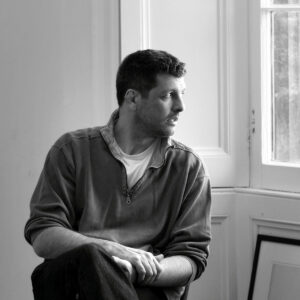 Slowing the planet’s spin is one of the blessings of the creative process, and it is what has anchored sculptor and painter John Clark within the art world – throughout spells teaching, working in galleries and an interlude as art director in the games industry.
Slowing the planet’s spin is one of the blessings of the creative process, and it is what has anchored sculptor and painter John Clark within the art world – throughout spells teaching, working in galleries and an interlude as art director in the games industry.
John has exhibited as far as Miami and Beijing and was a contestant on BBC Two’s Show Me the Monet. “I gradually got more disillusioned with the way things were going in the art world,” he recalls. “As artists in Glasgow when I was young, we were all about taking control of our own destiny. That was great, except all that effort on marketing or networking was getting in the way of people making interesting work.”
He broke free of the radical art circles and moved to Cambridge, where the video games industry was thriving. “I was interested in this coming together of art and science,” John explains. “I saw the games industry as a great new world.”
That interest in digital art never evaporated. In 2016, John created his first ‘flat sculpture’, designed on his computer, then printed and folded on paper. He envisages them as extensions of his narrative paintings. “I make the ingredients and plonk them in whatever space they can occupy.”
Working on PlayStation One on tight polygonal budgets fed into John’s artistic stance, resisting the painstaking portrayals of some contemporary work. “Whenever I see detailed photographic depictions, I feel the enormous burden of work,” John says. “It makes me want to collapse in empathy.”
The computer is like a doll’s house – you’re moving puppets around
John’s bread and butter is relationships. “Narrative painting is difficult to do well, because society no longer accommodates the narratives that everybody wants,” he says. “The computer is like a doll’s house – you’re moving puppets around, doing the same thing again and again. It’s a bit like being a writer, starting off with a character and not knowing what you’re going to do.”
For John, the purpose of art has altered over time. “When I was younger, I would have been appalled at the idea that art was therapy,” he asserts. “I regret dismissing that aspect of creative work or play. You’ve got to take it seriously, without being burdened by it.”
Catherine Carr, Audio Producer
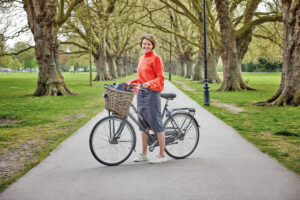 “I grew up on a diet of Woman’s Hour,” Cambridge resident Catherine Carr recollects. Tallying over 20 years of broadcasting experience, working on her favourite show is just a taste of what she has achieved. Continuing with the BBC, she produced and reported for Radio 4’s You and Yours, created Where Are You Going? for the BBC World Service and presents The Exchange. Her venture into podcasting, the ever-popular Talking Politics, has flooded earphones since 2016.
“I grew up on a diet of Woman’s Hour,” Cambridge resident Catherine Carr recollects. Tallying over 20 years of broadcasting experience, working on her favourite show is just a taste of what she has achieved. Continuing with the BBC, she produced and reported for Radio 4’s You and Yours, created Where Are You Going? for the BBC World Service and presents The Exchange. Her venture into podcasting, the ever-popular Talking Politics, has flooded earphones since 2016.
Many of her shows find inventive methods to tease out stories, from interrupting passers-by in the street to putting those with similar stories in conversation. It was while talking to colleague Jane Garvey about her sisters – a vicar’s wife and prison officer – that the kernel for her latest podcast was revealed.
“Thinking about sibling relationships is always something I’ve done more than others, because I had to,” Catherine says. After her parents separated, the two eldest sisters were raised in the UK, while the youngest grew up in the Netherlands.
New show Relatively was born just before Covid-19 arrived, a period that was a boon for podcasting in many ways. “Podcasters realised we could do interviews over the internet,” notes Catherine. “It’s quite an intimate form. The texture that you get in the audio from being at home and talking as if on a phone call was a gift. I wanted that intimacy of eavesdropping on a sibling relationship.”
Catherine has encountered the whole gamut of family dynamics, across every demographic, learning how constraints within sibling relationships make their mark over years. “There’s a bit of history involved,” Catherine muses. “When I had Nick and Gill Hornby on, their reference points went back 20 years further than mine. The way that children are brought up, thought of and cared for really changes over time.”
Reciprocal love is at the heart of my podcasts
While Relatively asks hard questions, Catherine insists: “There is reciprocal love at the heart of the podcasts that I make.” She continues: “People don’t talk about siblings much. Publishing on parenting outnumbers publishing on siblings by something ridiculous. Yet it’s such a formative relationship.”
A relatively new form, Catherine sees more on the horizon for podcasters. “People say the market is saturated, but that’s a load of rubbish. With publishing, you wouldn’t say: that’s enough books; or let’s stop with the films. The exciting podcasts are where people are being creative with format and sound. If you are going to make a show, don’t assume that because podcasting is to audio how YouTube was to music – democratised – it will be easy. The truth is, you need one of four things: contacts, skill, a good idea and luck.”
Christian Cowan, Fashion Designer
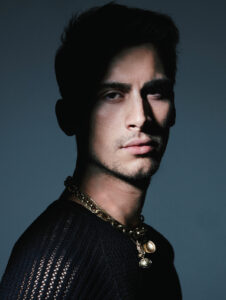
Christian Cowan, photographed by Greg Swales
Christian Cowan’s fashion career, which has flown him from rural Cambridgeshire to the Big Apple, was kindled when his parents bought him a red mini sewing machine from John Lewis. He founded his New York studio in 2016 (aged just 21) and has dressed the likes of Billie Eilish, Jennifer Lopez and Doja Cat.
Haute couture was not always Christian’s calling. Initially, entomology and herpetology had him hooked. “My father was a glaciologist, my mother a glacier surveyor. They always fostered an interest in the natural world. I wanted to be David Attenborough, then realised I didn’t have the smarts to do natural sciences at Cambridge. What drew me to those two animal categories is that they’re the most colourful and visually expressive. Discovering fashion design was kind of like creating your own bug.”
I try not to constrain myself with one finite inspiration
Against the strict advice of professors, the designer had bedecked Lady Gaga and Miley Cyrus before graduating from Central Saint Martins and London College of Fashion. “That classic trajectory of inspiration to final product, I’ve always been bad at. I will randomly think of a piece, draw it and stick it on my wall. Once I have a selection, I work out the world they live in, trying not to constrain myself with one finite inspiration. I’ve done that and it feels two-dimensional.”
Fusing old-fashioned glamour with a modern verve, Christian says: “It’s a bit like a dream. The pieces are made up of lots of different things you’ve seen throughout the day, then it amalgamates together.”
Christian is endlessly encouraged by his mother; not only as his champion, but a stylistic inspiration. “I try to keep this air of chicness and glam – that’s something my mother always had. She’s a Spanish woman who would always wear black pencil skirts, kitten heels and pearls every day.”
Since hatching Lil Nas X’s first red carpet look, Christian has branched out into menswear and gender-fluid design. Many of his projects have donated profits to LGBTQ+ charities. “I’ve always been proud of my queerness and loved how the community brings in all these people who are disenfranchised from their home towns. It only feels right that we do what we can to give back.
“There’s enough stress in life – why confine yourself to one category of clothing or berate someone else for wearing something different?” he says. “Whatever way you want to express yourself, do it and be proud.”
Aminah Rahman, Poet
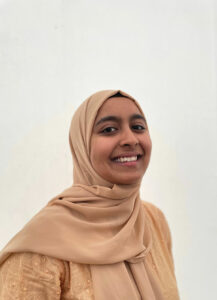 Aged 11, Aminah Rahman won her first poetry contest. Although her interest in the art of words had already been brewing, it was a formative moment. By the following year, she had completed her first major body of work – and has found herself skipping between commissions (International Women’s Day and South Asian Heritage Month)and performances (representing Cambridgeshire at BBC Upload Festival and The Big Weekend) ever since.
Aged 11, Aminah Rahman won her first poetry contest. Although her interest in the art of words had already been brewing, it was a formative moment. By the following year, she had completed her first major body of work – and has found herself skipping between commissions (International Women’s Day and South Asian Heritage Month)and performances (representing Cambridgeshire at BBC Upload Festival and The Big Weekend) ever since.
“My mum is an author and inspired me, but she writes historical fiction,” Aminah explains. “I went down a different route.”
In her poetry, Aminah tussles with themes of identity as a Muslim woman, balancing personal reflection and a direct call for social change. “The process is chaotic,” Aminah reveals. “It’s not the same every time, sometimes it takes days.”
Having evolved into a spoken-word performer alongside a poet, connecting to audiences is another aspect to contemplate during the creative process. “You have to think about how audiences can be involved in the performance, but sometimes it’s more about considering my own thoughts and feelings. Not everyone has to understand what you’re saying or what you’re writing: if it makes sense to you, that’s enough.
“Being able to perform, especially right now, feels special,” Aminah adds. “It gives everyone a bit of hope and happiness. That’s what I’ve always wanted to promote.”
Ellie Dixon, Singer-songwriter
There are many musical nooks scattered across Cambridgeshire, from which an exciting crop of artists are emerging. Ellie Dixon, TikTok wizard and alt-pop artist, is among them. From open mics in Saffron Walden to her first Junction performance, an endorsement by Cambridge 105 Radio’s Tim Willett to a BBC Radio 1 spotlight, Ellie has rocketed on to the national stage. This culminated in a performance at Camp Bestival and headline set on the BBC Introducing stage at Latitude.
“I started producing unseriously when my dad downloaded a piece of software on the family computer called Mixcraft,” says Ellie. “I was obsessed with being able to make any sound I wanted. It was stupid songs and experiments, which I think is the best way to get started with anything – the fun comes first.”
From there, Ellie’s studio started to grow, accumulating equipment purchased with birthday and Christmas money. “If you can make sounds you like on rubbish kit, then you don’t take it for granted when using the good stuff – and really know what you’re doing.”
Ellie’s songs are injected with a healthy dose of humour, both in her approach to sound and subject matter. “Randomness is such an amazing tool – I’ve always been interested in people rolling the dice to figure out what note to sing next.
“Music is an extension of myself – and I’m just stupid,” Ellie continues. “I didn’t write funny songs originally; they were emotional and mysterious. When I started writing songs that felt like me, it was better. It did take confidence to get to that point, because it’s scarier and more vulnerable projecting yourself.”
Ellie’s talents don’t end with songwriting. Directing her music videos and creating all her social content, she explains: “I like things to be fully formed – a visual experience, as well as auditory.” On TikTok, she has amassed over one million followers, a medium which has been crucial for the next generation of musicians, many of whom are part of the burgeoning landscape.
“Bedroom pop is the absolute height of freedom of expression,” says Ellie, “but it’s not easy coming out of your room. It’s nice to have a supportive scene, especially post-Covid. The world of music has completely changed.”
Ellie credits the Cambridge scene for setting her on the right track. The NMG Awards, especially, were crucial for mingling with other artists. “There’s such a difference between local shows and the national industry. Seeing Cambridge musicians made it feel less like jumping into complete darkness.”

